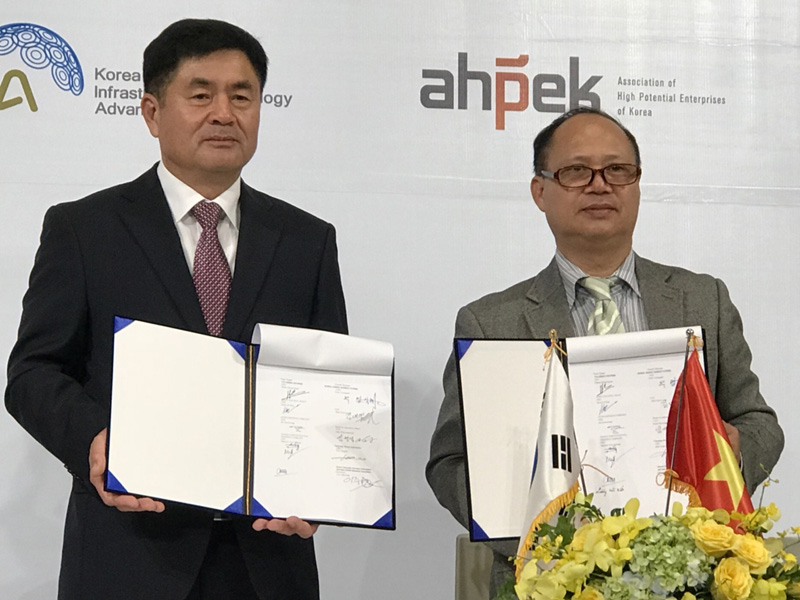
(HBO) – A joint venture project to implement "a green hydro power ship” in Hoa Binh province between Vietnam and the Republic of Korea (RoK) has been signed in Hanoi, with representatives of the RoK Government and relevant agencies of Vietnam in attendance.

The signing ceremony between the two power companies of
Vietnam and the RoK
The floating
power production project is to provide environmentally-friendly energy using new
technology. Under the agreement on the project, the joint venture company will
invest nearly 50 million USD to install 20 sets of the floating power generation
system with a total capacity of 20 MV.
The company will ask for permission from authorities of Hoa Binh province and
relevant Vietnamese agencies conduct surveys and carry out the project in the
lower part of the Hoa Binh hydro power plant stretching to areas contiguous to Phu
Tho province and Hanoi. Once launched in early 2018, the company will complete
the installation of first horizontal turbines a capacity of 1 MV for the floating
power generation system and begin generating electricity on the occasion of the
National Day (September 2).
Directors of the two green power
companies hand over the signed documents to each other, as witnessed by
participants.
According to specialised agencies’ assessments, hydro power using the floating
power generation system is more efficient than the traditional method due to
the river’s flow will not be changed, opening up opportunities to maximise huge
water resources of Vietnam’s river systems. It is also in line with the Party
and State’s policy on clean and sustainable electricity development.
The green power joint venture also holds a great importance on the occasion of the
25th anniversary of Vietnam-RoK diplomatic relations, and affirmed efforts of
the two countries’ businesses in a series of event celebrating the APEC
Economic Leaders’ Week in Vietnam
According to data from the Hoa Binh Provincial Party Committee, the industrial production index for the first six months of 2025 is estimated to have increased by 20% compared to the same period last year. This marks the highest year-on-year growth rate for this period since 2020.
In the first six months of 2025, Hoa Binh province’s export turnover was estimated at 1.145 billion USD, marking an 18.11% increase compared to the same period in 2024. Import turnover was estimated at $ 804 million, a 17.15% increase, which helped the province maintain a positive trade balance.
The lives of the ethnic minority farmers in Tan Lac district have gradually improved thanks to the new directions in agricultural production. This is a testament to the collective strength fostered through the professional associations and groups implemented by various levels of the district’s Farmers’ Union.
With the motto the "product quality comes first,” after nearly one year of establishment and operation, Muong village’s Clean Food Agricultural and Commercial Cooperative, located in Cau Hamlet, Hung Son Commune (Kim Boi district), has launched reputable, high-quality agricultural products to the market that are well-received by consumers. The products such as Muong village’s pork sausage, salt-cured chicken, and salt-cured pork hocks have gradually carved out a place in the market and they are on the path to obtaining the OCOP certification.
In the past, the phrase "bumper harvest, rock-bottom prices" was a familiar refrain for Vietnamese farmers engaged in fragmented, small-scale agriculture. But today, a new spirit is emerging across rural areas of Hoa Binh province - one of collaboration, organisation, and collective economic models that provide a stable foundation for production.
Maintaining growing area codes and packing facility codes in accordance with regulations is a mandatory requirement for agricultural products to be eligible for export. Recently, the Department of Agriculture and Environment of Hoa Binh province has intensified technical supervision of designated farming areas and packing facilities to safeguard the "green passport" that enables its products to access international markets.




